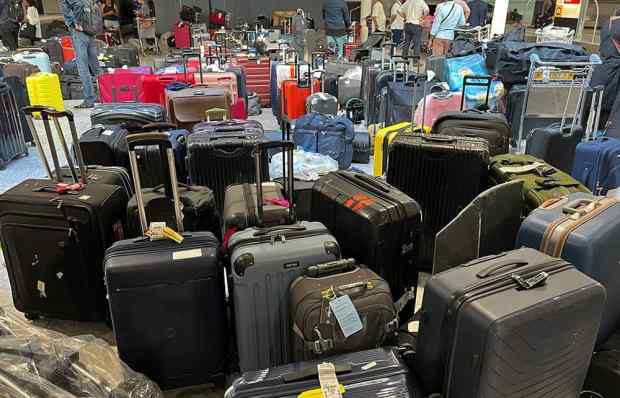Hit-and-miss, heavy-handed, but a necessary use of justice to deter repetition. That was my summing-up, last year, of the Serious Fraud Office’s probe into the Libor and Euribor scandal, in which just nine low-ranking traders from four banks were convicted, despite evidence that rate-fixing malpractice had been endemic throughout the money markets for years. In the case of the SFO’s inquiry into the controversial capital–raising that enabled Barclays to escape a taxpayer bailout in 2008, the summary has to be ‘miss-and-miss, heavier-handed than ever’. But still I ask: was it worthwhile as a warning to others?
The nub of the case was the payment to Qatari investors, to secure their participation in the rapidly assembled multi-billion Barclays deal, of ‘advisory fees’ that gave them a fatter return than other investors — and whether those fees represented value to Barclays in terms of other business generated, or were a sham. At first the bank itself was accused of fraud along with five of its senior people, including chief executive John Varley. But in the end no one was convicted, the last three in the dock — Roger Jenkins, Tom Kalaris and Richard Boath — having been acquitted at their second trial last week. A key strand of their defence was that the bank’s directors, lawyers and other advisers ‘knew everything’. Whatever whiff attached to the deal, it had been scrutinised at every level and if the SFO could not advance a corporate charge against the bank, arguably it was never going to nail the individual players.
SFO director Lisa Osofsky has spoken of the ‘antiquated’ 19th-century body of law she has to work within. She has said nothing of political pressure to see senior bankers banged up after the financial crisis — but that, combined with her long-ago predecessor George Staple’s view that in complex fraud cases, ‘even a single conviction’ is worth having ‘if it goes to the heart of the wrongdoing’, must explain the SFO’s tenacity against the odds. As to the deterrent effect of this hugely expensive 12-year quest for justice, I fear there will be none at all: on the contrary, a precedent has been set, and tested in law, as to how to do last-ditch deals with the greediest of investors.
Neutron Jack
Jack Welch, the former chief of the US manufacturing giant General Electric who has died aged 84, was named ‘Manager of the Century’ by Fortune towards the end of a 20-year tenure in which he drove GE’s market capitalisation from $14 billion- to more than $400 billion, but would win no prizes today. He personified a style of Reagan-era management machismo (of which Lee Iacocca, the hero of Chrysler, was another exponent) that’s now utterly out of fashion.
The nickname ‘Neutron Jack’ reflected his willingness to slash his own workforce; for Welch, ‘shareholder value’ was supreme, while stakeholder theory — the idea, currently undergoing a revival, that workers, suppliers, customers and the planet have rights akin to shareholders — was for cissies. It’s hard to picture him listening to presentations on ‘purpose’ in any modern boardroom. But he might have found a niche as a Downing Street adviser: among his maxims were ‘Control your destiny, or someone else will’ and ‘Bureaucrats must be ridiculed and removed’.
Passing through Heathrow
Encouraged by the promise of concerted central bank action, including rate cuts where there’s anything left to cut, stock markets steadied at the beginning of the week. But media coverage of the spreading virus and the measures needed to cope with it reached new heights of panic-stirring — and I guess I’ve picked a bad time to be flying in and out of what I have previously called the ‘world-class nightmare’ of Heathrow.
As I queue to be screened, at least I’ll have time to contemplate the unloved airport’s future. After the Court of Appeal ruled that plans for a third runway are illegal because commitments under the 2016 Paris Agreement on climate action had not been adequately taken into account — and the government declined to appeal — a furious row kicked off between distressed free-traders and jubilant anti-pollutionists. Heathrow boss John Holland-Kaye put up a fight with his catchy slogan ‘No Heathrow expansion, no global Britain’ but his cause looked forlorn — and I actually think he’s wrong. We really would be doomed if our economic fate depended on reconfiguring this piecemeal postwar relic, but it doesn’t.
Greta-mania is now likely to prevent any major new airport schemes, but existing assets could surely be better used. Holidaymakers are happier channelled through Gatwick, Luton and Stansted, which were actually designed for them. A slightly longer runway might enable Kidlington (now ‘London Oxford’) to welcome mid-sized planeloads of Chinese shoppers heading for Bicester Village. Heathrow’s restricted freight capacity is a genuine trade issue, but Manchester and Birmingham are gagging for more — and why not create a freight-only super-hub at Manston, near Ramsgate, with its triple-width runway that’s currently a lorry park?
As for the business travellers who will save our bacon by selling British goods and services around the world, they prefer smaller departure airports with quiet lounges, fast wifi and no hoi polloi; and they don’t mind changing planes in Paris or Amsterdam so long as the whole journey goes smoothly. So I would dedicate Heathrow’s Terminals 4 and 5 to them — and send in the bull-dozers, not to blast a new runway but to flatten the tired old central buildings. I’m picturing a funky new affordable–housing complex in their place, under a soundproof dome in the style of The Truman Show.
And with that happy exercise in lateral thinking, I’m off to take the temperature of Bernie Sanders’s home state of Vermont before lunching my way southwards to Washington. I’ll hope to report from there.
Got something to add? Join the discussion and comment below.
Get 10 issues for just $10
Subscribe to The Spectator Australia today for the next 10 magazine issues, plus full online access, for just $10.
You might disagree with half of it, but you’ll enjoy reading all of it. Try your first month for free, then just $2 a week for the remainder of your first year.















Comments
Don't miss out
Join the conversation with other Spectator Australia readers. Subscribe to leave a comment.
SUBSCRIBEAlready a subscriber? Log in